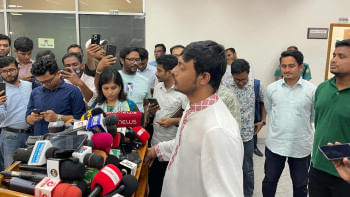War cabinet formed

April 13, 1971
BANGLADESH WAR CABINET
A six-member war cabinet headed by Bangabandhu Sheikh Mujibur Rahman was formed today. It was announced that Syed Nazrul Islam as vice-president and the Awami Leage party General Secretary Tajuddin Ahmad as prime minister, would guide and coordinate the war of liberation. According to the announcement, other members of the government are Khandaker Mushtaque Ahmed, Capt Mansoor Ali A. H. M. Kamaruzzaman.
Asked if India would recognise the new government of Bangladesh, Indira Gandhi said today "the matter will receive due consideration".
DINAJPUR, LALMONIRHAT FALL
Two towns -- Dinajpur and Lalmonirhat -- in the northwest of Bangladesh fell today to the Pakistani army as battles with Bangladesh resistance forces were fought in many parts of the country, the Press Trust of India (PTI) reported.
PTI said Dinajpur had been overrun by an army column. It added that the Bangladesh liberation army inflicted heavy casualties on the column but was forced to withdraw from the town under pressure of artillery fire. The second town, Lalmonirhat, was reportedly recaptured by the Pakistan army after a bitter fight.
The PTI reported earlier today that the annual monsoon rains had broken early in Bangladesh and were hampering the movement of Pakistani troops. It said the rains, which had come about four weeks early, had hit the districts of Comilla, Chittagong and Sylhet.
PTI further reported that a bloody battle was in progress for Comilla, a vital supply and communications centre.
APPEAL FOR INTERNATIONAL INITIATIVE
Oxfam and War on Want, two of the principal charities responsible for distributing the £1.5 million of relief for Bangladesh given by British people after the Bhola Cyclone, appealed to the British government to take an international initiative and help to establish supply channels into the country. They said that the country faced a famine "of immeasurable extent" for three reasons. Import of food grain, vastly increased since the cyclone, had now been stopped. Secondly, available stocks concentrated in storage centres at Chittagong and other sites were unlikely to have been distributed and some loss must be assumed. Lastly, the war would interrupt the harvesting of the present small rice crops, planted between main crops, and hinder the full planting of the spring crop because seed crop and fertilisers had not been distributed.
US ACKNOWLEDGES SALES OF AMMUNITION TO PAKISTAN
The State Department conceded today that the United States had been selling approximately $2.5 million worth of ammunition yearly to Pakistan since 1967 as "nonlethal" equipment.
Robert J. McCloskey, the state department spokesman, explained that United States supplies of both lethal and nonlethal equipment had been embargoed when the India-Pakistan fighting erupted in 1965.
"In 1966 and 1967 the embargo was lifted to permit sales of what we have described as nonlethal equipment," McCloskey said. "Although I acknowledge that to some extent it included ammunition."
McCloskey acknowledged that President Agha Mohammad Yahya Khan had still not responded to proposals by the United Nations and the United States for an international relief effort in Bangladesh. He reiterated the willingness of the United States to assist in such an effort.
Shamsuddoza Sajen is a journalist and researcher. He can be contacted at [email protected]

 For all latest news, follow The Daily Star's Google News channel.
For all latest news, follow The Daily Star's Google News channel. 



Comments